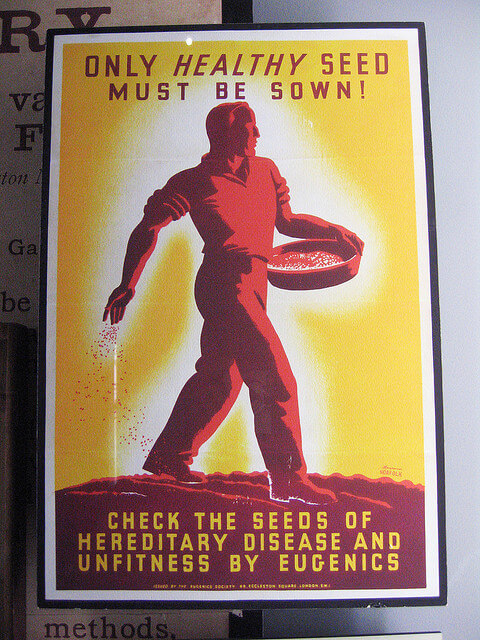Dramatic developments in medical genetics, including the ability to tinker with our genetic inheritance, has thrust the issue of eugenics back into the headlines again. The latest person to take up the cause of this once-discredited movement is Nathaniel Comfort, professor at the Institute of the History of Medicine at The Johns Hopkins University, who has just published The Science of Human Perfection: How Genes Became the Heart of American Medicine.
“The eugenic impulse drives us to eliminate disease, to live longer and healthier, with greater intelligence and a better adjustment to the conditions of society,” he argues in a thought-provoking piece in The Chronicle of Higher Education. He claims, provocatively, that eugenics is an irrevocable impulse to improve our selves, and this impulse is playing out in new ways now that society has access to an expanding set of genetic tools.
These are controversial grounds to re-plow. Although often portrayed as offensive by today’s standards, classical eugenics—which means “good genes”—has its roots in the progressive era at the turn of the twentieth century. Social Darwinists propagated the belief that social progress could only be attained by phasing out “undesirable genes.” Though offensive by today’s standards, the scientists who formulated them were, by and large, respected and respectable. Their work was very much mainstream, and their speculation sounded reasonable to an establishment convinced that it was threatened by an invasion of immigrants from Southeastern Europe. The scientific establishment offered a progressive solution: “positive eugenics,” which would encourage society’s elite to have more children—the founder of Planned Parenthood, Margaret Sanger, was an eager proponent of eugenics—and “negative eugenics.” The “negative” wing of eugenics prevailed, however, which for the most part meant restricting the mentally ill, the poor, immigrants and non-whites from propagating. It served as an inspiration and justification for Nazism and the “Final Solution,” which led to the discrediting of the entire movement.
Now, eugenics is back in vogue with a clear focus on the positive role that genetics can and is playing in medicine and health. As Comfort argues:
“The eugenic impulse drives us to eliminate disease, to live longer and healthier, with greater intelligence and a better adjustment to the conditions of society. It arises whenever the humanitarian desire for happiness and social betterment combines with an emphasis on heredity as the essence of human nature. It is the aim of control, the denial of fatalism, the rejection of chance. The dream of engineering ourselves, of reducing suffering now and forever.”
There are many arguments against eugenics—even against the voluntary “positive” eugenics that Comfort appears to embrace. Forbes reporter Alex Knapp espouses the common view that nobody is “eugenically unfit”—that all humans are inherently valuable. (He argues that society has advanced too far scientifically and morally for eugenics to still be relevant, but he focuses solely on “negative” eugenics.) The Center for Genetics and Society, a left-leaning organization with myopic views on genetic engineering, believes it is particularly socially and ethically reprehensible to alter the genes that we pass on to our children.
Over at Science 2.0, the precautionary Gerhard Adams opines that the eugenics concept itself is flawed because there is no way to determine whether a trait is evolutionarily beneficial. “Some may argue that we have plenty of evidence from our experiences in animal domestication,” he writes, “yet who would claim that these results are an improvement of the original species? The modifications have made these animals more compliant with human demands, but improved the original species?” He continues that, if given a choice, humans will converge toward genetic homogeneity, which is also bad for the species.
The problem with Adams’s line of reasoning is that modern eugenics aspirations aren’t about top-down measures like the Nazi atrocities or the forced sterilizations of the past, as Comfort points out. Instead of being driven by a desire to improve the species, new eugenics is being driven largely by the individual’s personal desire to be as healthy, intelligent and attractive as possible—and for our children to be so. Those choices will doubtless be driven by fashion and market pressures rather than a consideration for the greater good.
As more people adopt these new eugenic practices, those choices could become less voluntary, or at least hard to turn down. Science 2.0 founder and editor Hank Campbell argues that once it becomes possible to engineer “superior” human beings, then a parent’s only moral choice will be to have genetically “improved” children.
So, should we restrict personal choice in genetic enhancement, in order to shape the evolution of our species? In a post about prenatal sex selection and reproductive rights, science blogger Cameron English argues against it. “There’s no doubt that we need to consider the difficult ethical questions that arise as our ability to manipulate nature improves,” he writes. “But making ominous predictions and restricting personal choice shouldn’t be a part of that discussion, at least not without evidence.”





